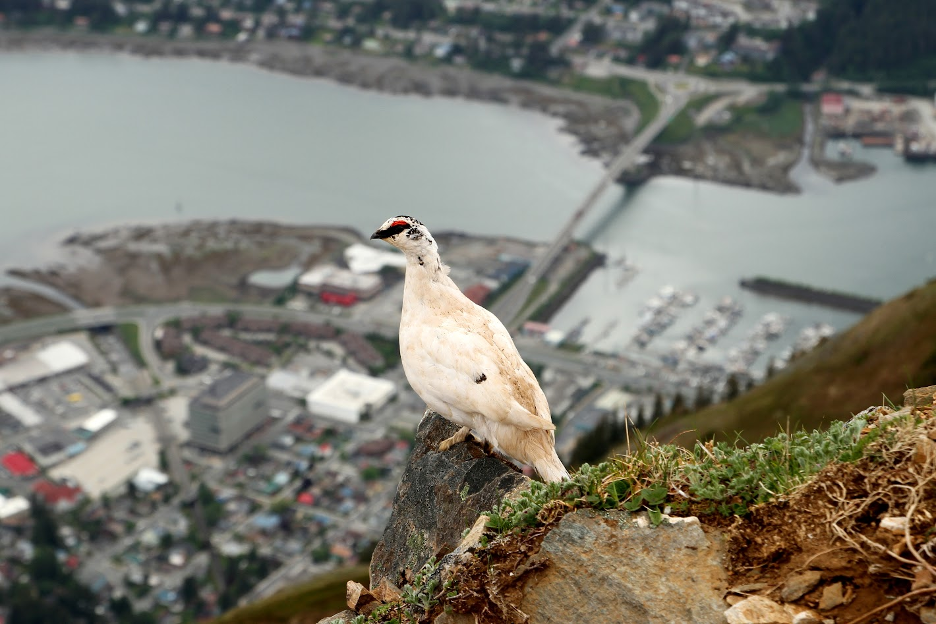As the urgency to address climate change becomes increasingly important, so does the need for proactive stewardship of the Earth’s rapidly changing biosphere
 Human activities and infrastructure, such as cities and roads, may reduce future options for species as they need to move to keep pace with climate change. Shown is a willow ptarmigan above a port city. Image Credit: Chris Sergeant.
Human activities and infrastructure, such as cities and roads, may reduce future options for species as they need to move to keep pace with climate change. Shown is a willow ptarmigan above a port city. Image Credit: Chris Sergeant.
The study has been reported recently in the Science journal.
“There is actually a lot we can do to help systems cope with oncoming climate change,” says Simon Fraser University biology professor and author Jonathan Moore, who with University of Washington professor Daniel Schindler, reviewed and assessed the potential benefits of forward-looking approaches. “From restoring connectivity to reducing local stressors to conserving future habitats—all of these proactive approaches can help the ecosystems that we rely upon to adapt to climate change.”
Keeping that in mind, for ecosystems and species to adapt and be flexible, it is vital to outgrow preservation-oriented methods and incorporate those that allow ecological change.
Local efforts to conserve biodiversity and regenerate habitat complexity will also help maintain a diversity of future options for species and ecosystems in an unpredictable future.
Daniel Schindler, Professor, University of Washington
While the movement of species into new habitats has been primary to the adaptive response of the biosphere to a changing world, climate change is also influencing such ecosystems. This results in the loss of a few species and the addition of others.
The authors observe that conservation must not just concentrate only on “climate change losers” but also on proactive management of rising chances and pressures. In the Arctic, shrinking sea ice and warming oceans might enable more fish production but endanger a few species like polar bears that tend to depend on the ice for hunting seals.
Furthermore, ice loss in the Arctic Ocean raises pressures from industrial activities like oil and gas and shipping traffic exploration that pose environmental threats. Such pressures must be controlled in an advanced method to steward the Arctic ecosystem into the forthcoming days.
The biodiversity of the Earth has a history of change, along with species, genes, ecosystems, and populations all shifting fluidly with a changing world.
Earth’s systems have incredible capacity to adapt and be resilient to changes. That is what has allowed some species to persist for millions of years. But our actions are seriously undermining that adaptive capacity.
Jonathan Moore, Study Author and Biology Professor, Simon Fraser University
The authors warn that even with the most stringent emission reduction strategies, further warming will “persist for decades” before possibly recovering, and strategies to allow adaptation and flexibility will be the key to conserving biodiversity and retaining functioning ecosystems.
Natural resource management and conservation efforts will need to embrace the dynamic aspects of the biosphere to help maintain functioning ecosystems and protect biodiversity amid ongoing climate change.
Jonathan Moore, Study Author and Biology Professor, Simon Fraser University
Schindler believes that human kind must decrease greenhouse gas emissions.
Schindler stated, “The reality is that the world is warming and that systems are changing. We often expect that ecosystems will always look the same, or that certain species will always be found in the same locations.”
“The biosphere has never been static—and we need to embrace management approaches that maintain a dynamic and fluid biosphere. Thus, conservation and management need to be prospective—looking to the future, and proactive—taking action for the future,” added Schindler.
Journal Reference:
Moore, J W & Schindler, D E (2022) Getting ahead of climate change for ecological adaptation and resilience. Science. doi.org/10.1126/science.abo3608.